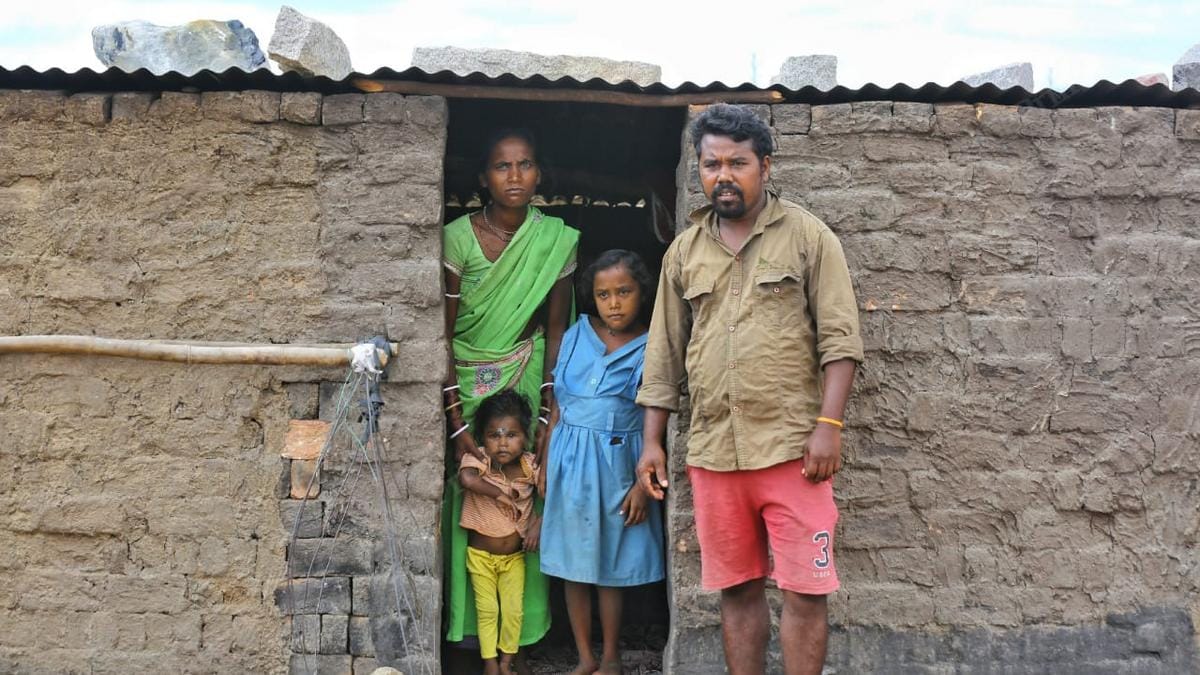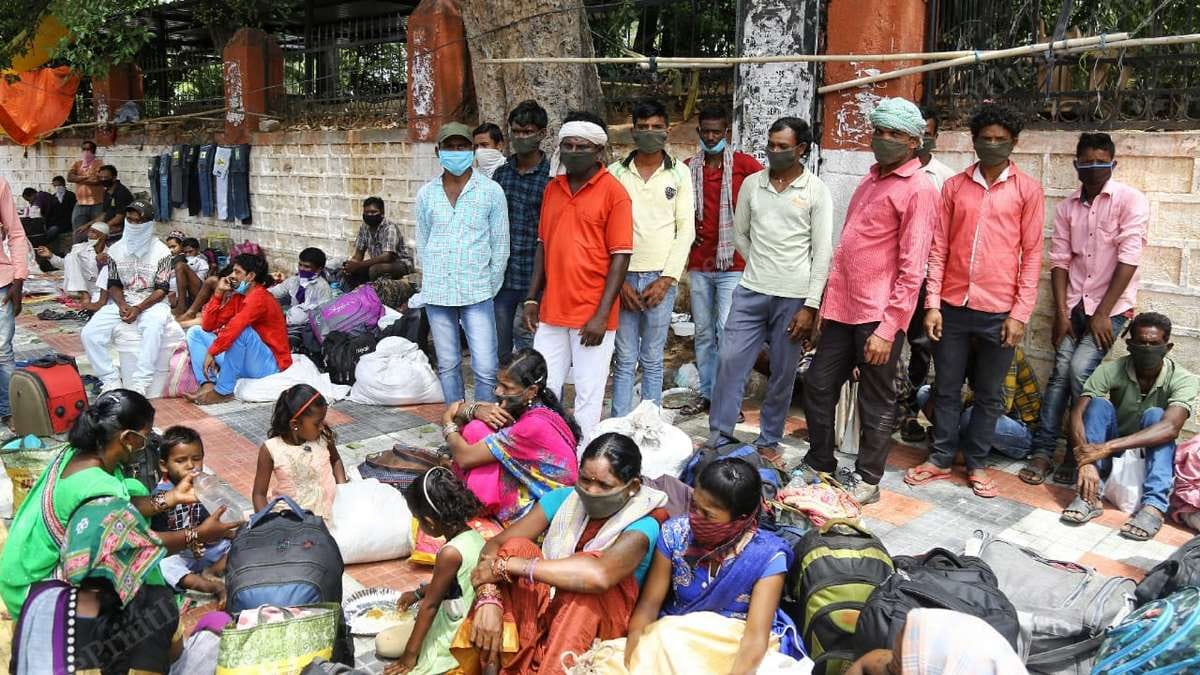Rangareddy district (Telangana): Telangana’s capital Hyderabad is gradually moving out of the lockdown. But as one heads into the countryside from the city, the impact of the Covid-19 lockdown is visible on the once-thriving brick kilns in Rangareddy district, earlier called Hyderabad Rural.
Most brick kilns wear a deserted look, barring a few worker families staying there. Many workers, who hail from Odisha, have already gone back to their homes, or are stranded on highways. But those who stayed back now say they cannot wait to return to their villages, and never want to come back to Telangana.
Workers from Odisha form the backbone of Telangana’s brick kiln industry, with an estimated 85-90 per cent making up the work force. And several owners ThePrint spoke to fear that if they don’t return, it could hurt the industry.
But the workers accuse the kiln owners and the state authorities of apathy in providing them bare essentials under the lockdown. Their plight was taken note of by the Telangana High Court, which directed the state government to find out how many workers are still stranded, how many want to go home, and to arrange for their transportation and food. The matter will be heard next on 9 June.
Telangana’s joint labour commissioner L. Chathurvedi told ThePrint: “Our deputy commissioners have been put on the job according to the HC’s orders, and we have made arrangements to shift the workers to our government shelters, where they will be provided adequate food and whatever essentials they require.”
The brick industry in Telangana had an estimated turnover of around Rs 150 crore in 2018, which fell to Rs 125 crore in 2019. But this year, its turnover is estimated to be under Rs 50 crore, according to Rajendra Reddy, president of the Brick Kiln Manufacturers’ Association of Telangana.
Also read: Behind Telangana’s rising Covid numbers, low testing and violations of ICMR, HC orders
State of the industry and workers
Brick kilns are spread across Telangana, in the districts of Rangareddy, Sangareddy, Medchal, Karimnagar, Warangal, Nalgonda, Nizamabad and Yadadri Bhuvangiri.
According to data accessed from Telangana’s labour department, there are 1,091 brick kiln units, with 55,145 workers. However, Rajendra Reddy says his association alone has over 2,000 brick kiln owners as members.
“The government has only registered the bigger brick kilns with more area and those on the periphery of towns. But they’ve left out several other smaller ones in remote area, in villages near temples. In Telangana, there are brick kilns everywhere,” he said.
Activists such as A. Krishna of the Human Rights Forum say the total number of workers at these kilns who have been affected by the lockdown could be up to 1.3 lakh.
“The damage is more than one imagine,” Krishna said.
A vast majority of workers in the kilns come from the drought-prone districts of Nuapada and Kalahandi in Odisha. They arrive between November and January, and leave by mid-May to sow rain-fed crops in their villages.
The Telangana government suddenly announced a lockdown on 22 March, three days before the national lockdown began. This was then followed by four phases of lockdown extension, leaving these migrant workers stranded.
Also read: Worst yet to come, Centre will realise nothing’s left for poor as economy reopens: Owaisi
Never coming back, better to die hungry
At one brick kiln near Kongara Kalan village in Rangareddy district, Neeran Jaal made his way out of a makeshift shack barely five feet long and three feet wide and covered in a black plastic sheet. He said he would’ve left by the first week of May, but he’s been waiting to hear from his “seth ji” (the owner of the brick kiln) about transport arrangements.
Recent pre-monsoon showers ruined the bricks that were ready, and the workers will not get wages for them, he alleged.

Neeran had come to Telangana with four other families from Odisha’s Nuapada district in January this year, with a promise of Rs 30,000 for each person for the six months they would stay here. This would work out to Rs 60,000 per family, since their wives also work at the kilns. The workers say they have received payments until March, but since then, all they have got is apathy and mistreatment.
Sitting on a rock outside the shack, Neeran said none of them received any of the rations (12 kg rice/wheat) promised by Chief Minister K. Chandrashekar Rao during the lockdown. When they tried to sneak out to get essentials from the nearest market, policemen would run after them with sticks, he alleged.
“I am never coming back,” Neeran said, a sentiment echoed by several others at the brick kiln.
When ThePrint asked Hyderabad’s chief ration officer Bala Maya Devi about the allegation that rations were not being provided, she said, “All those with food security card were provided ration as per the report we’ve received.”
Judeshi, a 50-year-old woman also from Nuapada, said she was waiting to get back to her village for the sake of her two daughters. She too said she would never come back.
“At least we can demand some basics from our own sarkar (government), unlike here. They don’t care about us,” she said angrily, showing the marks on her shoulder from carrying the bricks.
At another brick kiln two kilometres away, ThePrint saw workers packing their bags at their makeshift shacks.
“I don’t want to ever come back. It is better to die hungry or earn the little money I can back in my village than suffer like this,” said Renu Dharma, one of the workers. He works as a coolie in Odisha for the rest of the year.
“As coolie, I would barely earn Rs 100 a day, and sometimes not even that. But here, I was getting Rs 250-300 in a day sometimes,” Renu said, watching his three-year-old daughter play with clay pots.
“We were taken thrice to the station by the owner’s men, and then brought back to our shacks. We have no clue what’s going on. This afternoon again, they said we will be taken by train to Odisha, but if they don’t, we will have to come back,” he said.
Scores of migrant labourers were also sitting on the pavement outside the Secunderabad railway station, many of whom were also brick kiln workers with similar stories.

One of them, Dhungri Thandy, told ThePrint: “We came here in an autorickshaw from our kiln, but we don’t even which know which train will take us. No one is guiding us, they say no train will leave for Odisha for the next two days.”
Thandy was accompanied by nearly 30 more workers from various brick kilns desperate to get home. And most of them echoed the common refrain — we are never coming back.
Also read: Geo-mapping, CCTV cameras, AI — how Telangana Police is using tech to enforce Covid safety
Owners helpless too
Chivam Prasad, who also owns a brick kiln near Kongara Kalan (different from the ones whose workers were quoted above), told ThePrint that having invested around Rs 1 crore in the business, he might have to look for an alternate profession in order to survive, if the workers don’t return.
At Prasad’s kiln, a worker is paid Rs 250 for laying 1,000 bricks. “Four people are capable of making 5 lakh bricks usually. However, this year, they could make only 3 lakh bricks, and that, too with great difficulty,” he said.
“We did not receive any cement or zinc for production because of the lockdown, and now that we can get some, the workers are desperate to leave,” Prasad said.
He added that if there is no Covid-19 vaccine by next year, the workers won’t return, and the industry, which has already been hit hard, can’t survive without sufficient labour as it’s in the unorganised sector.
V. Sambhya, owner of a kiln in Tukkuguda, also in Rangareddy district, said: “We are doing all we can (for the workers). But beyond a point, even we are helpless. We get no subsidy from the government.”
Sambhya added he was fearful that the industry won’t survive for long if the workers don’t come next year.
“One needs skilled workers to make as well as lay the bricks, so we are dependent on them to a large extent.”
A brick kiln owner in Karimnagar, Marian Reddy, said he had also incurred major losses. “We were forced to suspend work for over a fortnight as we didn’t have sufficient material supply due to the lockdown,” he said.
Another brick kiln owner in Karimnagar district, who didn’t want to be named, said, “What will a brick kiln unit do workout its workers, without basic material, without buyers? The market has been impacted too. Construction activity was anyway put on hold, so now buyers also aren’t coming forward.”
High court order
The Telangana High Court Tuesday directed the deputy commissioners of labour to inspect the brick kilns and find the number of workers still employed there, the number of those who would like to go back to their states, and to make necessary arrangements for their transportation and food.
The court issued the direction on a writ filed by S. Jeevan Kumar Reddy, a retired professor and member of the Human Rights Forum, which shed light on the pitiable condition of brick kiln workers stranded on the highways or dumped by owners to let them find their way home.
The petition sought thorough documentation of the brick kilns and the workers who are required to be transported to Odisha without any financial burden on the workers, besides food and shelter.
Taking cognisance, the Telangana High Court bench said it is the duty of the state government to ensure that the workers are not charged any fare, either by the railways or by the state transport corporation, and directed Advocate General B.S. Prasad to submit an ‘action taken’ report on the next date of hearing, 9 June.
The bench also pointed out that most migrant workers are illiterate and non-Telugu speakers, so the government should evolve a simpler registration process and data collection for shramik trains or state buses. The court also directed the government to coordinate with the railway department and request for an increase in shramik trains to other states.
It also directed the government to evolve a “comprehensive policy” to deal with migrant workers now as well as in future, as a “disaster can strike the state, or nation unannounced”.
Also read: Vitamin D, good hygiene — chief of India’s top nutrition body shares key Covid tips
Labour department’s arrangements
Joint labour commissioner Chathurvedi said his department is “taking all measures” for the workers’ benefit.
“A high-level meeting is to be held in a day as we were waiting for divisional commissioners to gather the data about kilns in their areas before we arrange transport,” Chathurvedi said, adding that until the workers are stranded, especially pregnant women and children, they will be put up in government camps and provided proper food.
Chathurvedi said according to a labour department survey, 23,000 brick kiln workers had already left in trains arranged by the government.
“We have also spoken to the owners of these brick kilns who are also willing to arrange private transport for their workers, to ensure no more delay,” he said, adding that there is also an option to add two or three coaches for brick kiln workers in special trains.
Asked about the workers’ comments that they would never return to Telangana, damaging the brick industry, Chathurvedi said: “We have counselling units and are trying to explain the situation to the migrants. That’s the best we can do, as there is too much panic. We hope that after Covid, all these apprehensions will settle down too.”
Also read: We know how to protect our people, accusation of low testing wrong: Telangana health minister







There were ways and means available to these owners to retain the workers but they did not do that. Now at that time, they failed to wake up. We must reap what we sow. Modi can not find a solution for all the problems. People must contribute.